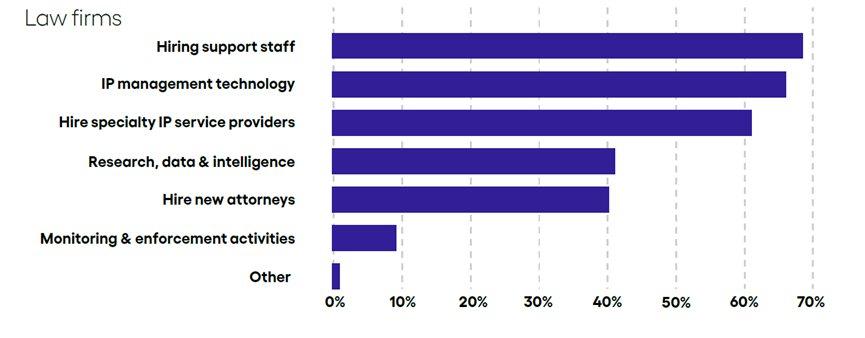Today, IP teams play an increasingly important role in protecting the interests of companies. Intellectual property, as an intangible asset, demonstrates the rigor and fiscal responsibility of corporate business. This has led to an increase in reliance on parameter-driven decisions to measure the impact of IP strategy and resource management, including technology, data tools, personnel statistics, and external partners. UnitedLex, headquartered in San Jose, California, has released a report titled "2024 Intellectual Property Impact Study: Benchmark Value Trends". The report explores the impact of law firms and companies measuring the effectiveness of their intellectual property processes and the intellectual property assets they protect and enforce through a survey of 200 intellectual property professionals, in-house lawyers, and privately-practised intellectual property professionals in the United States.
According to the law firms and in-house lawyers surveyed, they are relying more than ever on metrics-driven insights to assess the impact of IP strategy and resource efficiency – including technology, data tools, headcount and external partners.
- 67% of in-house IP professionals surveyed said grant success rate is the best way to measure external counsel performance
- 50% of law firm IP attorneys surveyed said their client IP work is performed on a fixed fee basis
- More than 60% of respondents said trademark search and analysis was the primary area in which they used data tools and technologies
Brief conclusions of the report:
1. The number of intellectual property applications continues to increase
- The majority of in-house and law firm respondents expect IP filing activity to increase in 2024, with only 1% of in-house teams and 5% of law firms expecting a slowdown. IP professionals say this expected growth is driven by the growth of emerging technologies and artificial intelligence, with businesses eager to protect their inventions and innovations. This backdrop also raises expectations for increased IP spending in the coming year, despite financial pressures affecting internal resources. More than two-thirds of in-house teams expect IP investment to increase, with hiring support staff and external IP experts becoming investment priorities.
2. Dealing with operational resistance
- Common challenges cited by both law firms and in-house teams are regulatory changes (62% in-house, 48% in-house, with both IP practitioners citing this as driven by evolving AI and data privacy rules) and resource constraints (45% in-house, 57% in-house). These resource constraints lead to bottlenecks, with trademark prosecution, as the top priority for IP teams, taking up the most time and resources, likely due to the USPTO’s backlog that has extended examination times. Against this backdrop, in-house teams and law firms need to allocate resources more wisely — for example, certain IP litigation activities (such as patent applications) do not need to be completed by senior IP attorneys, allowing them to focus on higher-value work.
3. Demonstrating value is essential
- Given these resource constraints, being able to demonstrate value to senior management is critical, especially for in-house IP teams. More than half of respondents (55%) said they use product revenue as an important KPI for demonstrating value, followed by IP portfolio growth (51%) and litigation results (46%). While 55% are focused on revenue, almost half of in-house teams are still constrained by a mindset where the department is viewed as a cost part of the business, rather than a revenue generator. But this can be addressed through greater IP monetization or more aggressive litigation.
4. Data mining is on the rise
- More IP managers recognize the need to use data tools more than ever to manage IP prosecution activities and improve efficiency. - About 80% of in-house IP departments and law firms are using data tools, including AI and predictive analytics. Most businesses that are not using data tools expect to start implementing them within the next 12 months, with the majority of the rest planning to do so within the next two years. The emergence of generative AI could support these efficiency efforts, although most IP professionals we interviewed are currently cautious about adopting advanced AI tools (AI won’t be writing patents anytime soon).
The report also discusses several major factors that affect the growth of law firms’ business. Data shows that among the surveyed firms, there are five major factors that affect business:

At the same time, the survey also shows the direction of capital investment in 2024 :

The report also reveals the obstacles that future IP teams will face and how to demonstrate value to clients.
Users can go to the official website of Yezhima to download the full report.
联系咨询
 | Get exact prices For the country / regionE-mail: mail@yezhimaip.com |

